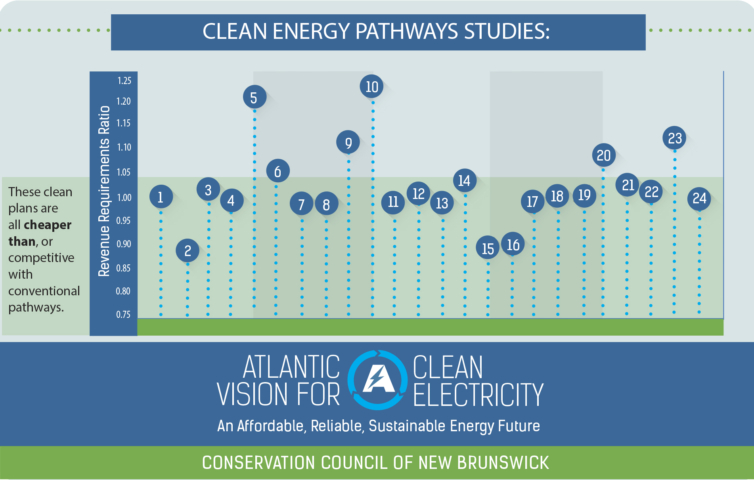
Key Findings
The report presents a broad-scope view of more than two dozen studies and scenarios to provide context and support for energy system planning in Atlantic Canada. Key findings include:
Clean energy portfolios are cost competitive with conventional portfolios.
Even when environmental externalities are not valued and quantified, clean energy portfolios from a variety of studies have costs that are lower or very close to conventional portfolios. With few exceptions, our research indicates clean portfolios are affordable. They can also be expected to keep more spending, investment and jobs local, thereby contributing to healthy and sustainable economic growth in our communities.
Clean portfolios, based on renewable energy, demonstrate significant greenhouse gas reductions.
In both the electricity sector and economy wide, the combination of decarbonized electric supply, efficiency, strategic electrification, and flexible load management can be used to create plans that result in 50% medium term, and 80% to 90% long-term reductions in greenhouse gas emissions.
The end use and supply side technologies required to create such portfolios are available today.
Moreover, electric systems can reliably, and cost effectively, be designed and operated with high levels of renewable energy saturation.
The financing for clean energy portfolios, for both investor owned and public utilities, can reasonably be expected to be less costly and less risky than for fossil fuel and nuclear projects.
With lower operating costs, lower operating risks, lower environmental compliance risk, lower risks for decommissioning, and greater modularity, clean portfolios are likely to have increasing advantage over conventional resources in attracting capital investment.
Social equity metrics
Growing attention is being given to social equity metrics as a means to improve ability of clean energy portfolios and initiatives to benefit all customer classes, and to enhance the equity of economic development impacts from more equitable investment and job creation.
“Our research provides starting references and grounds for further investigation on many of these points. It also clearly illustrates the trends we highlight above, and points towards an increasingly bright future for clean energy portfolios.”
Energy Futures’ David Hill Tweet
